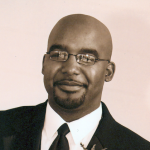Terrell Carter
St. Louis, Missouri

Terrell Carter is well versed in both the arts and community development. He is a visual artist and has exhibited his work nationally and internationally. He primarily works in oil sticks and oil pastel, and ink prints. He teaches various arts and interdisciplinary courses for St. Louis Community College at Wildwood. He is also the Director of a new certificate program for Central Baptist Theological Seminary in St. Louis.
He is also the Executive Director of the North Newstead Association, a nonprofit community development corporation that builds low income housing in north St. Louis City. Prior to that he served as the Executive Director of CREATE, Inc. (Community-Based Resources Ensuring Access to Everyone), a nonprofit organization that coordinates social services for seniors in St. Louis City, St. Louis County, and Southern Illinois. He also previously served as a police officer for the City of St. Louis.
Terrell has earned a Bachelor of Science with a double major in Biblical Studies and Organizational Leadership, a Master of Fine Arts with a concentration in Arts Management and Leadership, and a Doctor of Theology. He is the author of Machiavellian Arts Management: Timeless Advice for 21st Century Arts Managers.
Presentation(s):
Empty Space as Common Ground: Open/Closed and Deliberative Innovation
Day 2 / Apr, 13 @ 10:30 am
1st Floor : Room A
Open/Closed is the middle ground between the extremes; it is the collective efforts of St. Louis residents envisioning collaborative solutions for empowerment. As an annual summit, Open/Closed strives to facilitate thoughtful, open conversation about population flight, disinvestment, and vacancy. As a civic organization, Open/Closed engages uncommon partners to link the emergent results of community-oriented creativity, enterprise, and policy. They are helping develop infrastructure for lateral civic thinking that will unsettle the most durable presumptions about the urban fabric. Unsatisfied by proclamations of population growth and conventional economic development, Open/Closed recognizes the potential for artists, entrepreneurs, advocates, neighbors, and leaders to learn through iteration, engage on contested issues, and acknowledge the multiplicity of forms. Open/Closed is a creative enterprise because the animated civil society, ultimately, is the crafting of the possible. St. Louis, Detroit, Cleveland, Youngstown, and Pittsburgh are human places. Crafted by people, dismantled by people, and, hopefully, remade by them, we have been instructed to revile the chaos, disorder, and collapse of our past. In contrast, Open/Closed imagines this biography as our defining attribute. The organizers lionize not the possibility to rewrite these cities into creative, political or social legibility, but to enhance our literacies to the existing city and its diversity of practices. This panel will help tell this story, but it will surely be incomplete, an incompleteness that should inspire all creative practitioners to find all the possible authors.





